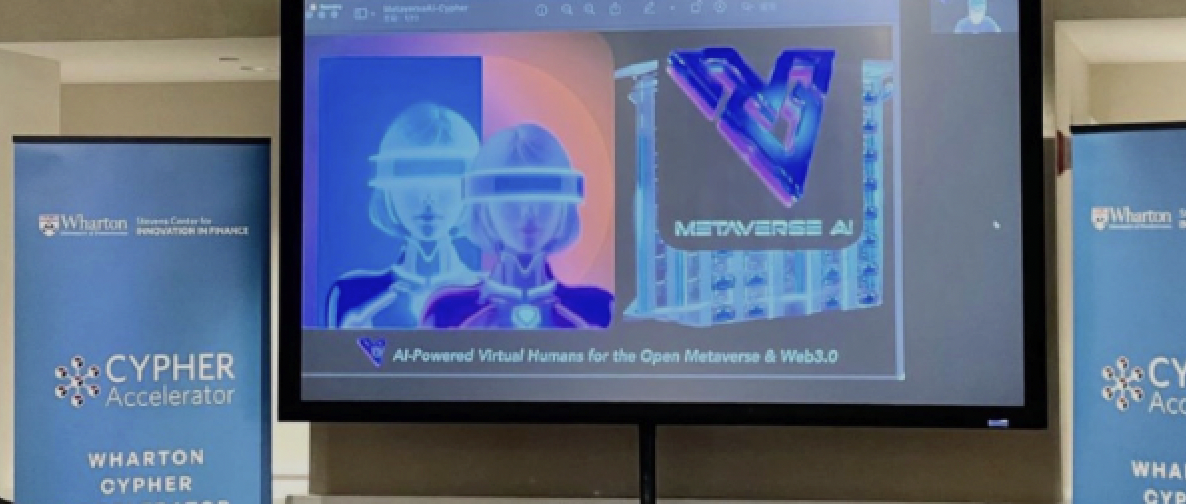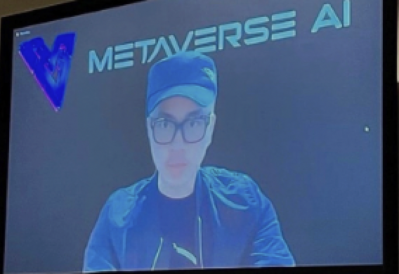6 Questions for Entrepreneur Henry Yan of Metaverse AI


The best way to understand the virtual world of business that’s taking shape is to go deep with the people who dwell daily in that commercial space.
Wharton Global Youth recently spoke with Henry Yan, the co-founder of Metaverse AI, a startup company that spent three months learning and growing with the Cypher Accelerator, a support program for young crypto and blockchain companies that is run by the Wharton School’s Stevens Center for Innovation in Finance.
Metaverse AI operates within the AI avatar layer of the industry, populating the metaverse with its intelligent virtual beings, who are smarter than your typical computer-generated avatars.
Henry connected with us to contribute to our exploration of all-things metaverse – with a look at virtual identity.
Wharton Global Youth: Metaverse AI is described as building the open metaverse with AI-powered virtual human and Web 3.0 apps. Can you break down those various components for us?

Henry: A virtual human is your digital identity in the virtual world. Think about your avatars. I’m sure high school students are very familiar with gaming. In games and virtual worlds, you interact with a lot of virtual characters that are not real. In gaming terms, it’s called an NPC, a non-player character. Those NPCs enrich your experience in the virtual world. To represent yourself in the virtual world, you need to digitize yourself. You will have a 3D avatar that looks like you, talks like you and behaves like you. It can be your agent in the metaverse. They are virtual avatars with intelligence. We really put a lot of emphasis on the intelligence part, because other companies just build a 3D asset that looks like you. But our virtual avatars can learn from your behavior and build intelligence over time, so eventually they can talk like you and think like you. Right now, we’re working with enterprise clients (large companies). We provide those AI virtual beings for different industries, like gaming, fashion and sports. We’re working with some athletes right now to turn them into virtual beings. The virtual avatar for the athletes can interact with various fans and various brands worldwide. Eventually, we will open up the functionality to consumers, so everyone is able to create their own virtual beings.
Web3 is really about decentralized and democratized technology. In the Web3 world, you own the data and you own the virtual assets. They’re not owned by a centralized entity. You can think of it as a self-sovereign metaverse; you own your digital identity and the identity is censorship-proof and it is also self-sovereign because only you have access and control over your virtual identity.
The metaverse is a virtual world and interconnected. What I mean by interconnected is that eventually the users can traverse between the different virtual worlds with their own identity and their own assets. Currently, think of the different gaming worlds. They are separate. And you need to create your own identity and create your own experience in different worlds. With open metaverse, everything is interconnected. Imagine you can traverse between one virtual world to another with your avatar and your assets and your experience.
Wharton Global Youth: Did you get interested in working in the metaverse because of gaming?
Henry: I’ve always been fascinated with virtual worlds and interactive experiences, especially VR and AR. Another catalyst for me was my experience working as a product manager at Facebook. At the time, I worked on a lot of mixed reality and augmented reality products. That helped me appreciate the importance of spatial computing. Spatial computing means you overlay information and intelligence over the physical world. That got me excited about the future of the metaverse. I worked at Facebook for two years, first as a software engineer and then as a product manager.
Wharton Global Youth: You describe the metaverse future as phygital. Can you explain what you mean?
Henry: This means physical + digital. The best way to explain is to show you. We’ve worked on a virtual fashion application before and the phygital is game-changing. Imagine you own a piece of the fashion in real life — in the physical form — and you also have the digital property right as an NFT that you can wear in the virtual world with virtual fashion. You wear the fashion on the streets with normal clothing, and in the virtual world you pull that over and can wear that digital fashion in the virtual world, as well.
Wharton Global Youth: Metaverse AI creates virtual humans. Who and what is Cyberhuman AI?
Henry: We haven’t released the announcement for the branding yet, but the product is out there. With the help of industry partners and Wharton, we launched a virtual celebrity. A virtual celebrity is a completely digitized virtual persona. The virtual celebrity can function as a real celebrity does. For example, she has become the brand ambassador for New York digital fashion week and for various AI and tech companies. The virtual persona can be the brand ambassador and help companies enter the metaverse. The virtual celebrity is called Yuki, and she has her own Twitter and Instagram page. She has generated a lot of buzz over the internet.
Wharton Global Youth: What is one aspect of the metaverse that you think will blow our minds?
Henry: Hyperrealism (the virtual is becoming increasingly real). As you can see in the latest Avatar movie, those avatars are hyperrealistic. You can imagine that the future technology will duplicate every single detail on your expression, your facial movements. Everything becomes hyperrealistic. Also, artificial intelligence will make your avatar very intelligent, so it looks like you and talks like you.
Wharton Global Youth: Back to that notion of the self-sovereign metaverse for a moment. Will we have full control over our information, assets and data in this virtual realm?
Henry: I believe that’s the only way forward. In a more hyperrealistic internet, which is what we like to call the metaverse because it’s a 3D world, everything gets more real and gets more personal and interconnected. It’s even more important to maintain user privacy. We believe that with technology such as blockchain cryptography and zero-knowledge proof, we can really improve user privacy.
Conversation Starters
What specifically does Henry Yan mean by the open metaverse?
What does he mean by a self-sovereign metaverse? Is that realistic? Do you think it will evolve that way?
Do you see yourself someday applying your gaming experiences to the metaverse economy? Which layer of the industry would you choose to be a part of and why? Share your story in the comment section of this article.
I have domain name metaverse.ai
It is no secret that Crypto, NFT, Metaverse, and AI have been dominating headlines in both the tech and financial industries. However, with the recent surge in the crypto market, the term NFT has become excessively associated with dubious and opportunistic schemes. Unfortunately, this negative reputation has overshadowed the exploration and investment in other promising areas like the Metaverse. In light of this, I would like to extend my congratulations to Henry Yan and his team for their commendable efforts in striving to bring positive change to the world.
While the term Metaverse has been around for over a decade, its practicality has gained momentum with Facebook’s recent shift to Meta. The involvement of tech giants like Apple, as evidenced by their Vision Pro, further solidifies the notion that the Metaverse is here to stay. However, one significant challenge I foresee in this industry is the issue of interoperability. With various companies building their own versions of the Metaverse, it becomes crucial to establish a bridge that connects these disparate virtual realms. It is essential to prevent the monopolization of the entire industry by a select few entities, as such a scenario would disrupt the core principles of blockchain technology, which are independence, decentralization, and democratization.
Furthermore, I am intrigued by the concept of Virtual celebrity discussed by Henry. Interestingly, here in Mongolia, this idea is not entirely new and has already garnered a significant following on social media, with successful business models and even investments secured from platforms like Shark Tank Mongolia.
As technology continues to advance, we often witness a future that resembles the dystopian landscapes portrayed in science fiction movies. However, I believe that this does not necessarily have to be a negative development. It merely calls for a cautious approach and a deliberate consideration of every step we take. While the evolution of society may seem rapid, it is important to approach it with a mindful mindset, ensuring that the progress we make aligns with our values and serves the collective well-being.